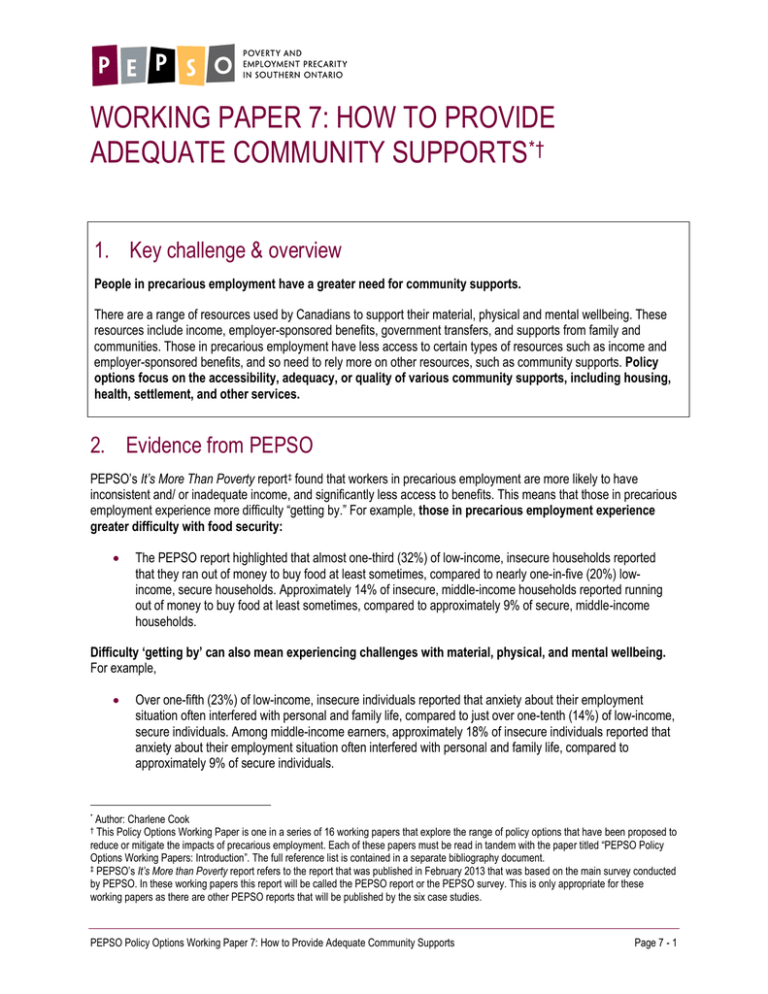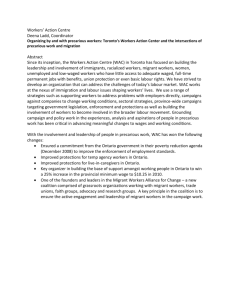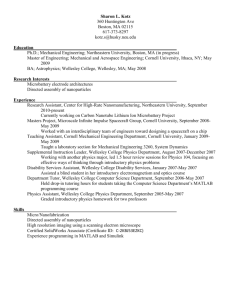how to provide adequate community supports
advertisement

WORKING PAPER 7: HOW TO PROVIDE ADEQUATE COMMUNITY SUPPORTS*† 1. Key challenge & overview People in precarious employment have a greater need for community supports. There are a range of resources used by Canadians to support their material, physical and mental wellbeing. These resources include income, employer-sponsored benefits, government transfers, and supports from family and communities. Those in precarious employment have less access to certain types of resources such as income and employer-sponsored benefits, and so need to rely more on other resources, such as community supports. Policy options focus on the accessibility, adequacy, or quality of various community supports, including housing, health, settlement, and other services. 2. Evidence from PEPSO PEPSO’s It’s More Than Poverty report ‡ found that workers in precarious employment are more likely to have inconsistent and/ or inadequate income, and significantly less access to benefits. This means that those in precarious employment experience more difficulty “getting by.” For example, those in precarious employment experience greater difficulty with food security: • The PEPSO report highlighted that almost one-third (32%) of low-income, insecure households reported that they ran out of money to buy food at least sometimes, compared to nearly one-in-five (20%) lowincome, secure households. Approximately 14% of insecure, middle-income households reported running out of money to buy food at least sometimes, compared to approximately 9% of secure, middle-income households. Difficulty ‘getting by’ can also mean experiencing challenges with material, physical, and mental wellbeing. For example, • Over one-fifth (23%) of low-income, insecure individuals reported that anxiety about their employment situation often interfered with personal and family life, compared to just over one-tenth (14%) of low-income, secure individuals. Among middle-income earners, approximately 18% of insecure individuals reported that anxiety about their employment situation often interfered with personal and family life, compared to approximately 9% of secure individuals. Author: Charlene Cook This Policy Options Working Paper is one in a series of 16 working papers that explore the range of policy options that have been proposed to reduce or mitigate the impacts of precarious employment. Each of these papers must be read in tandem with the paper titled “PEPSO Policy Options Working Papers: Introduction”. The full reference list is contained in a separate bibliography document. ‡ PEPSO’s It’s More than Poverty report refers to the report that was published in February 2013 that was based on the main survey conducted by PEPSO. In these working papers this report will be called the PEPSO report or the PEPSO survey. This is only appropriate for these working papers as there are other PEPSO reports that will be published by the six case studies. * † PEPSO Policy Options Working Paper 7: How to Provide Adequate Community Supports Page 7 - 1 For these workers, community supports can provide a bridge for these individuals and their families to support their wellbeing. 3. Context/current situation Canadians rely on a variety of resources to support their material, physical and mental wellbeing, including their income and savings, benefits from their employer and from government, and supports from family and communities. 1 Not all of these resources are available to workers in precarious jobs, particularly benefits offered by an employer, § or a union. ** These workers also generally have a lower income than those in secure employment 2 and may need greater supports from family, community and government. PEPSO research suggests that workers in precarious jobs do rely on family and community supports more than other workers. For example, they are more likely to rely on regular financial support from someone outside their household. 3 Workers in precarious jobs also use community services more than other workers, especially health services, employment services and other miscellaneous services (such as support for basic needs, individual and family life supports, etc). 4 The community support system is influenced by the roles of government and community service organizations, and these roles are connected. Governments fund community initiatives (e.g. social infrastructure investments), as well as community service organizations. Governments also provide direct supports to individuals (e.g. income security programs). Changes in recent years to the role and level of government supports may make it more difficult for workers in precarious jobs to access adequate resources and services when their needs are not met by their basic wage. The primary changes include: • • • Change in the amount and eligibility requirements of government transfers to individuals. 5 Change in the nature of transfers from the federal government to the provinces, with the federal government increasingly paying a smaller proportion of the cost of provincial health and social services. 6 Change in the nature of government funding to community service organizations, from core funding to short-term and project funding. 7 The latter two changes can influence the accessibility, quality and sustainability of community supports. It’s therefore important to explore options to improve the community support system to ensure that it meets the basic needs of workers in precarious jobs who rely on such supports, and also helps them to build better lives. 4. Policy options Many of the policy recommendations in this area focus on the accessibility, adequacy, or quality of various community supports, including housing, health, settlement, and other services. Some policy recommendations address service delivery, while others focus on the policy environment of community supports. Most policy options are universal, while some are specific to the needs of precarious workers. See working papers 4, 5, and 6 on how to provide extended health benefits, how to provide retirement benefits, and how to provide leave benefits for more information. ** See working paper 9 on how to enable more voice at work through unions and labour groups. § PEPSO Policy Options Working Paper 7: How to Provide Adequate Community Supports Page 7 - 2 4.1 Housing A large number of recommendations focus on housing, specifically the accessibility and affordability of housing. Recommendations include: • • • • • Investing in, improving, and supporting access to affordable housing. 8 Introducing a housing benefit for low-income Ontarians 9 that is delinked from social assistance 10 and reflects the different costs of housing for different groups (including families, people with disabilities, and seniors). 11 Developing a responsive and comprehensive provincial 12 or national 13 housing strategy. Supporting mixed-income communities, 14 or inclusionary zoning requirements, 15 with a specific recommendation to amend the Planning Act to support, or require, a portion of affordable housing in new housing developments. 16 Addressing the housing needs of workers in precarious jobs, including increased housing supports for people who are in poor housing conditions because of the nature of their jobs, 17 and ensuring access to loans when they can afford to buy a home. 18 4.2 Health Many recommendations highlight the importance of health services, with a particular focus on supporting access to health services. Recommendations include: • • • • Prioritizing access to primary care and/ or health promotion, 19 through community health centres 20 or health ambassadors. 21 Recommendations to address access issues also focus on eliminating user fees 22 and supporting the use of language interpreters. 23 Supporting funding for home care and elder care, 24 with one option focus on amending the Canada Health Act to include home care and palliative care. 25 Supporting health and the determinants of health through a Health in All policies framework across ministries and levels of government. 26 Working with clients to address the health impacts of precarious work. 27 4.3 Settlement Access issues are also prioritized in a number of recommendations focused on settlement services. Recommendations include: • Expanding access to settlement services regardless of status or length of stay in Canada, 28 including to temporary workers. 29 PEPSO Policy Options Working Paper 7: How to Provide Adequate Community Supports Page 7 - 3 • • Improving access to language training that better meets newcomer and labour market needs. 30 Improving coordination of settlement programs with other provincial programs such as employment or training programs. 31 4.4 Other community supports There are a number of additional recommendations that address a diverse range of community supports. These recommendations include: • • • Support for public transit 32 or a transportation allowance. 33 Ensuring access to leisure, culture, or recreation activities for targeted groups such as diverse groups or children 34 through subsidies. 35 Taking action on food security, 36 through a healthy food allowance for those on social assistance, 37 or funding for healthy student nutrition programs. 38 4.5 The community supports system General recommendations focused on the overall community supports system, and in particular quality, service integration, and funding. Recommendations include: • • • Developing sufficient and high-quality public services that improve living standards that could lead to employment and/ or higher wages. 39 Improving the integration of health, settlement, employment, and social services. 40 For example, focusing on the role of community-based service locations to coordinate intake and support service integration. 41 Supporting community service sustainability, collaboration, integration, and responsiveness 42 through longterm, or core funding. 43 A few recommendations focus on increasing funding for community services organizations that work with vulnerable workers, 44 or those that work in poverty prevention, reduction and alleviation. 45 4.6 Financial services and economic development A few recommendations focused on access to financial resources, or economic development. While some of these recommendations are related to the private sector, community-based supports may also have an important role. Recommendations include: • • • Improving access to financial resources through basic bank accounts, savings accounts that provide a match for each dollar saved, rather than an interest rate (with a focus on saving for a home, post-secondary education, or starting a business), or microfinance. 46 Supporting community organizations to provide financial literacy services. 47 Supporting local economic development, 48 with options such as social purpose enterprises that respond to employment or economic needs in a community. 49 5. Questions for discussion 1. Which policy options in this paper could have the most impact on the lives of those in precarious employment? 2. Which policy options in this paper can we realistically move forward on, given the current political, economic, and social climates? PEPSO Policy Options Working Paper 7: How to Provide Adequate Community Supports Page 7 - 4 3. Which policy options are missing from this paper, but require attention? 6. Endnotes Lewchuk, Vrankulj, & Lafleche, forthcoming PEPSO, 2013 3 PEPSO, 2013 4 Lewchuk, Vrankulj, & Lafleche, forthcoming 5 Herd, 2002; Mowat Centre, 2010 6 Health Canada, 2012; Library of Parliament, 1997; Office of the Parliamentary Budget Officer, 2012. 7 Hall, Phillips, Meillat, & Pickering, 2003; Mowat Centre, 2011b 8 25 in 5, 2009; 25 in 5, 2010; Canadian Policy Research Networks, 2006; NDP, 2013a; Ontario Campaign 2000, 2012; Wellesley Institute & Woodgreen Community Services, 2013 9 25 in 5, 2009; 25 in 5, 2010; Lankin & Sheikh (Ministry of Community and Social Services), 2012; Ontario Campaign 2000, 2012; PEPSO, 2013 10 CivicAction, 2011c 11 Wellesley Institute, 2011b 12 Ontario Campaign 2000, 2012 13 Liberal Party of Canada, 2012 14 Broadbent Institute, 2012 15 UWT, 2011 16 Institute on Municipal Finance and Governance, 2013; UWT, 2011 17 Arthurs (Human Resources and Skills Development Canada), 2006 18 PEPSO, 2013 19 Canadian Doctors for Medicare, 2011a; Wellesley Institute, 2011b 20 Canadian Index of Wellbeing, 2012; Social Planning Toronto, 2009; Wellesley Institute, 2011b 21 Social Planning Toronto, 2009 22 Canadian Doctors for Medicare, 2011b; Ontario NDP, 2013 23 Social Planning Toronto, 2009 24 Broadbent Institute, 2012; International Labour Organization, 2011a; Ontario NDP, 2013 25 NDP, 2013a 26 Wellesley Institute, 2011b 27 Access Alliance, 2013 28 Goldring & Landolt, 2012; Ng et al., 2013 29 Goldring & Landolt, 2012 30 Canadian Policy Research Networks, 2006; Institute for Competitiveness and Prosperity & Martin Prosperity Institute, 2013; Mwebi, 2012; NDP, 2013a; Wellesley Institute, 2011b 31 Law Commission of Ontario, 2012 32 25 in 5, 2010; Canadian Index of Wellbeing, 2012 33 Wellesley, 2011b 34 Canadian Index of Wellbeing, 2012 35 Wellesley Institute, 2011b 36 Social Planning Toronto, 2009 37 25 in 5, 2009; Wellesley, 2011b 38 Wellesley, 2011b 39 International Labour Organization, 2011a; Institute for Public Policy Research, 2013 40 Access Alliance, 2011 41 Wellesley, 2011b 42 Access Alliance, 2011; Richmond & Shields, 2004 43 Richmond & Shields, 2004 44 Canadian Policy Research Networks, 2006 45 25 in 5, 2009; Ontario Campaign 2000, 2012 46 Cities of Migration, 2013a 47 MISWAA, 2006 1 2 PEPSO Policy Options Working Paper 7: How to Provide Adequate Community Supports Page 7 - 5 48 49 Access Alliance, 2011 Working for Change, 2013 PEPSO Policy Options Working Paper 7: How to Provide Adequate Community Supports Page 7 - 6





